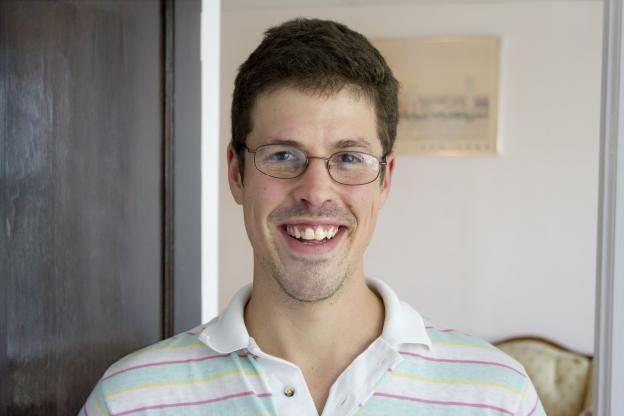|
|
Posted 2/2/2017 (link)
 Thanks to the diligent efforts of Aldon Nielsen, we're able to present audio and photos from this year's MLA Offsite Reading, which took place on January 6, 2017 at West Philly's Rotunda. The hosts and organizers for the evening were Davy Knittle and Anna Strong, along with Lily Applebaum, Zack Arrington and Mel Bentley.
Here's the all-star roster of poets in reading order: Seth Perlow, Diana Hamilton, Timothy Yu, Crossley Simmons, Anna Maria Hong, Danny Snelson, Angela Hume, Zhimin Li, Alexa Smith, Faye Marie Chevalier, Evie Shockley, Eric Keenaghan, Zack Arrington, Pattie McCarthy, Chris McCreary, Tsitsi Jaji, Ryan Eckes, Sean Collins, Ted Rees, Gabriel Ojeda-Sague, James Ingoldsby, Andrew Dieck, Michelle Taransky, Sue Landers, Frank Sherlock, CA Conrad, Anne Boyer, Laynie Browne, Andrew Gorin, Rachel Milligan, Raquel Salas-Rivera, Nicole Stemberg, Tung-Hui Hu, Oki Sogumi, Trisha Low, Emily Abendroth, Connie Yu, Paul Gorman, Mark Scroggins, Piere Joris, Habib Tengour, Marion Bell, Kristen Case, Orchid Tierney, Herman Beavers, Thomas Devaney, Steven Kleinman, Julia Kolchinsky Dasbach, Lauren Samblanet, Jason Zuzga, Leoard Schwartz, Christy Davids, Jim Krull, Amanda Silberling, A.L. Nielsen, Mel Bentley, Sara Jane Stoner, Knar Gavin, Meg Pendoley, Amish Trivedi, Maya Arthur, Davy Knittle, and Anna Strong.
You can listen to the entire reading or segmented files for each reader here. On our MLA Offsite Reading series page you'll find previous events from 2012, 2011, 2009, 2008, 2007, 2006, 2005, 2004, 1996, and the very first offsite from 1989.
Posted 2/6/2017 (link)
 We recently added a number of stunning short films by Ken Jacobs to our PennSound Cinema homepage. They include a half-dozen silent micro-films, each the length of a television commercial, created in 2016: Writhing Cities, Central Park, Snow in Headlights I, Window Cleaner, Dead Leaves, and Deader Leaves. These silent meditations serve as an amuse-bouche to unfamiliar viewers, introducing them to Jacob's use of the Pulfrich effect — an early film theory based on the notion that a projected image reaches each eye at a slightly different time (those interested in learning more can read a wonderfully-detailed explanation by Miriam Ruth Ross here) — built upon looped images that rapidly alternate from positive to negative. The resulting films effect a visual equivalent to the Shepard scale, seeming simultaneously static and in-motion, and creating a lush, immersive three-dimensional image.
This is probably a good point to warn readers that due to this intense flickering effect we recommend that those with epilepsy and similar conditions triggered by light avoid watching these films. They can be challenging even for those without seizure disorders: I started to get a headache after about a half hour with the films, but it was a worthwhile tradeoff for the viewing experience.
After the super-brief clips, we have a trio of longer films: Capitalism: Child Labor (2006), Another Occupation (2011), and Seeking the Monkey King (2012). On the small scale, these films operate much like the aforementioned shorts in terms of their flickering using the Pulfrich effect, however the images are further embellished with color washes, inset details, and other distortions, and evolve over time rather than fixating on one image. They're also scored, with Rick Reed providing music for the first two — which showcase tremoloed drones that shift from peaceful bell-tones to harsh metallic squeals — while J.G. Thirwell's soundbed for the last blends dramatic blockbuster pomp with calmer passages. In Capitalism we meditate on a haunting Lewis Hine-like image of young textile workers, while Another Occupation recycles and degrades found footage of Bangkok, and in Seeking the Monkey King we explore dazzling jewel-like landscapes of crumpled tinfoil while pondering occasional intertitles that rail against the titular monarch.
You can view all of these films, and listen to a three-part 2009 Close Listening program with the filmmaker on our Ken Jacobs author page.
Posted 2/8/2017 (link)
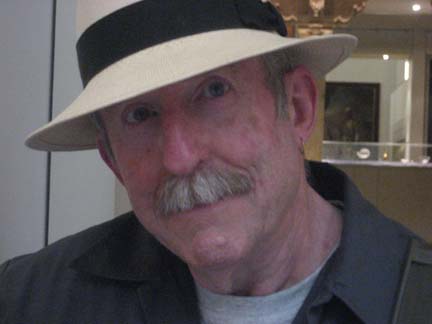 This evening brings the very sad, but not unexpected news that Tom Raworth has passed away after a long battle with cancer. The larger-than-life poet, editor, and translator was seventy-eight years old.
PennSound co-editor Charles Bernstein relayed the news from Raworth's wife, Val, and observed that "there were many false alarms as those of us who loved Tom grappled with the fact (or tried to) that he was in his last weeks. The intensity of the vigil is the measure of how much he meant to both those who knew him and those who know him by his work." He concluded, "I am drinking a gin and tonic now, toasting Tom, and also all of you who are reading this sad note." Over the past few weeks since news of his terminal condition broke many in our poetry community have shared what Raworth meant to them, and so I'll humbly do the same.
As a grad student, a decade or so ago, I first saw him read with Anselm Berrigan at an event Bill Corbett had organized at MIT to celebrate the publication of Ted Berrigan's Collected Poems. I had no idea who this strange man was who stood at the podium — hands splayed on either side of his papers, head bowed in a monastic pose — reading his poems at a breakneck pace without looking up. It was like nothing I'd ever seen before, and an apt complement to Berrigan's speedy poems that I knew well, though his own work moved beyond conversational ease into dense, abstract constellations of syntax and sensation that I wasn't yet ready to fully understand. It was a provocation, but one I wouldn't fully understand until a few years later when I came to work at PennSound, stumbled across Raworth's author page, learned that he didn't always read quite so quickly, and looked more deeply into his body of work. Since then, I've had the pleasure of introducing students to his poetry and while they too seemed a little intimidated at first, in time they'd relax and follow his lead and it would start to make sense. I also wound up as a PoemTalk panelist with some very august company discussing Raworth's "Errory," and managed (I think) not to make too much of a fool of myself.
Not long after news of Raworth's illness emerged, I discovered a well-worn copy of his Tottering State on the shelves of a local bookstore. At the same store last night, I noticed that it was gone. I like to imagine the person who picked it up, perhaps someone who's never read his work before, and think about the journey they have ahead of them — one that many of us have been well-rewarded to take.
We have quite a treasure trove of materials on our Tom Raworth author page, including the aforementioned PoemTalk, a 2006 Close Listening program, two discs from the venerable Rockdrill series, and readings from the early eighties right up to the recent past. This would be a very good time to have a listen.
Posted 2/13/2017 (link)
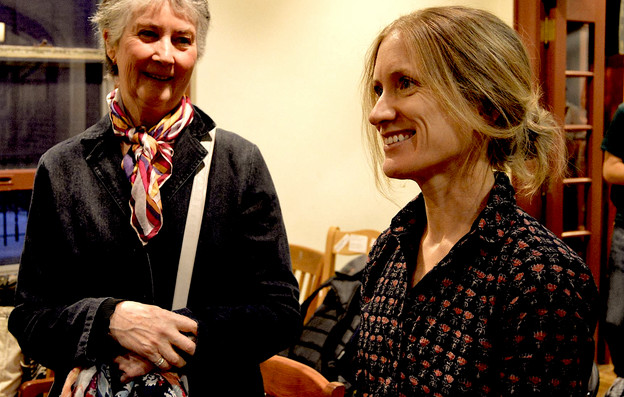 Last week saw the release of episode #109 in the PoemTalk Podcast series, which discusses the title poem from Kate Colby's 2015 Ugly Duckling collection, I Mean. This time around, host Al Filreis gathered a panel that included Siobhan Phillips, Emily Harnett, and Joseph Massey.
Filreis starts off his introduction on the PoemTalk blog by considering the implications of the poem's title: "The main task for the group, at least at first, is to enumerate the possible meanings of the prefatory tagline — and, in effect, the constraint entailed in — 'I mean.' 'I mean' means synonymizing, the list-maker's many options for draft equivalences. It indicates the job of trying to get the poem right. It means ironizing articulateness. It means amending, enduring the process of phrasal completion. It means disavowal, constant starting over. It refers to meaning's instability, of course. It equals idiomatic 'just saying' (ironic emphasis). It acts as a phrase breaking down the very word choice that follows. It means unironic emphasis. It enables a reference to the poem's own ongoingness (pleasure as a joy in uncertainty). It means that one can always mean something else — more. It means Whitmanian cataloging, the poem's ecstatic, open capacity. It invites a prefatory tick, permitting the poet to note or observe or say anything at all (list poem)." You can read more on Jacket2.
PoemTalk is a co-production of PennSound, the Kelly Writers House, Jacket2 and the Poetry Foundation. If you're interested in more information on the series or want to hear our archives of previous episodes, please visit the PoemTalk blog, and don't forget that you can subscribe to the series through the iTunes music store.
Posted 2/15/2017 (link)
Posted 2/17/2017 (link)
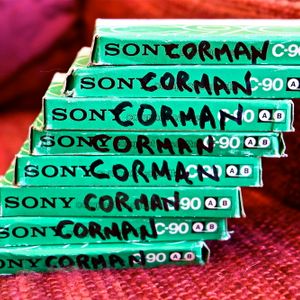 Here's a remarkable recent addition to our site that we wanted to make sure that you didn't miss: approximately eighteen hours worth of recordings of Cid Corman made by John Levy in 1974.
Steel Wagstaff, who originally digitized and posted these recordings last year was kind enough to share them with us, so that they might coexist alongside the wonderful bevy of materials — both Corman reading his own work and critical commentary by others — available on his PennSound author page. Wagstaff provides this context for the recordings:
In 1973, Cid Corman and his wife Shizumi Konishi Corman opened CC's, a coffeeshop in Kyoto, Japan. The second floor was a tatami space with a floor-to-ceiling bookshelf and a space where Cid hosted readings and talks. Soon after opening the shop Cid invited one of his many correspondents, an American named John Levy, to work at the shop for room and board. In 1974 and 1975 John taped some of the readings and talks on poetry Cid gave. During these gatherings of Cid's friends and customers (often other American & British writers), the group would sit, often in a circle, on the tatami mats.
Poets discussed in these sessions include Emily Dickinson, William Carlos Williams, Louis Zukofsky, Wallace Stevens, and Marianne Moore. Others have colorful names like "In Good Time & Words for Each Other," "0:1 & Little Books," or "Plight | & [infinity]." Again we are grateful to both Steel Wagstaff and John Levy, along with Bob Arnold (Corman's literary executor) for the opportunity to make these unique documents with our listeners.
Posted 2/20/2017 (link)
 Here's a remarkable new addition to our site, but one that only certain members of our audience are going to be able to enjoy: on our new PennSound author page for Edmond Jabès you'll find a 1974 documentary on the Egypt-born French author made by Jean-Pierre Prevost.
Originally broadcast on French television, the film features Jabès in conversation with Claude Royet-Journoud and Lars Fredrikson. As our own Charles Bernstein notes, it has not been seen in forty years. Unfortunately, it's presented as it originally aired, in French and without subtitles. It's too important a document not to share with our listeners, so if you are lucky enough to be fluent, or feel like giving your dusty high school French a shot, you can start watching here.
Posted 2/22/2017 (link)
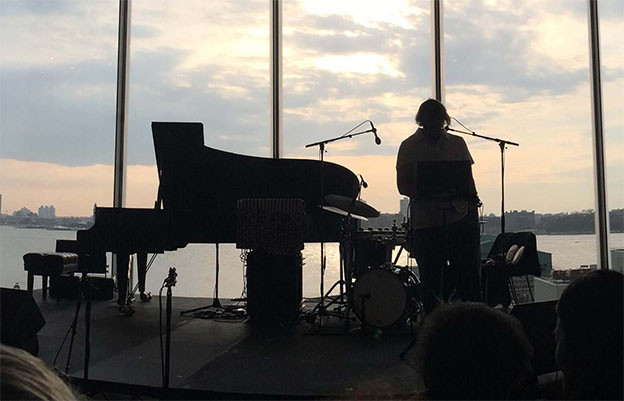 We've just published a wonderful new piece from Chris Funkhouser over at Jacket2. Titled "Being Matter Recorded: Cecil Taylor on/Poetry,", this essay serves as a complement to Funkhouser's participation in the Whitney Museum of American Art's exhibition focused on Taylor's work as well as "improvised is how the voice is used...", an interactive web-based matrix of excerpts from four hundred minutes of interview recordings (a large portion of which was published in Hambone #12).
More importantly, it traces Funkhouser's long and influential relationship with Taylor and his work over the past thirty years. Here's how he begins:
After my first firsthand encounter with Cecil Taylor's work in Charlottesville in November 1986, I never would have imagined having a series of extraordinary experiences with him across the decades that followed. Seeing him that first time, a two-hour solo concert during a thunderstorm, I didn't realize music could exist in such a different aesthetic universe — concert as a poem: words, movement, and sound, ominously beginning, "A stroke, the night." I had been exposed to all kinds of music and was a student of jazz via courses centered on the Smithsonian Collection, which included something of Cecil's work, but experiencing it live was as if someone from another planet came down to embody what music and performance could be — that every norm could be reshaped, if not broken altogether.
Funkhouser is a prolific and talented poet, critic, and archivist, and we're very lucky to have benefited to his generous contributions to both Jacket2 and PennSound over the years. You can start reading his latest here.
Posted 2/23/2017 (link)
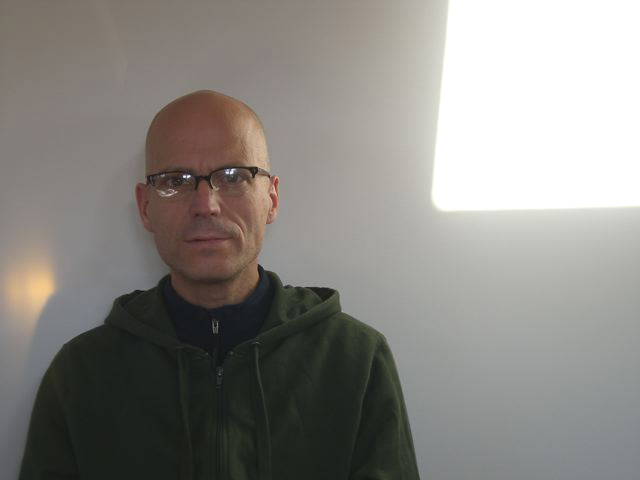 Here's is the latest addition to our author page for poet and critic Peter Jaeger to get your toes tapping for the coming weekend.
Daniel Penny, winner of the BBC's young composer of the year award in 2015, set Peter Jaeger's poem "Sub Twang Mustard" to music. The piece is performed here by members of the Yehudi Menuhin Music School and trombone soloist John Kenny, under the direction of John Cooney. "Sub Twang Mustard" was originally published in Jaeger's 2004 book Eckhart Cars.
You can listen in here and be sure to check out the rest of the recordings archived on PennSound's Peter Jaeger author page, including sets from Manchester's The Other Room series, the if p then q series in London, and a 2013 reading at London's Kingsgate Gallery. There's also a 2003 radio appearance from Resonance FM's program "Up on Air," and a 2006 recording of "Prop" made at London's Regal Lane Studios.
Posted 2/26/2017 (link)
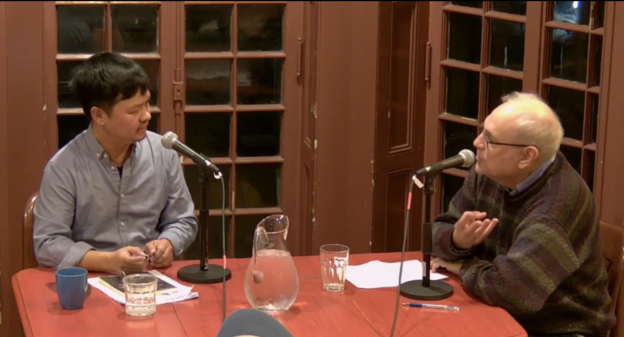 PennSound co-director Charles Bernstein is back with two recently-recorded programs in his long-running Close Listening series, which is broadcast by Clocktower Radio. Today, we'll highlight the first of these shows, which features ko ko thett, a poet, editor and translator from Burma/Myanmar.
ko ko thett is the author of The Burden of Being Burmese (Zephyr Press, 2015), a book hailed by John Ashbery as "brilliantly off-kilter," and is co-editor (with James Byrne) of Bones Will Crow, an anthology of contemporary Burmese poetry. He also serves as translator for the speeches of Aung San Suu Kyi. A student activist during the military dictatorship in Burma, ko ko thett spent many years living in exile in Finland, Austria, and the U.S.. He has recently returned to Yangon.
The two-part program begins with the author reading before a live audience at the Kelly Writers House on January 23, 2017. In the second half, he and Bernstein discuss his decision to write in English; his 19 years in exile and the experience of returning home; the political situation in Burma at the time of his exile compared to the present; his sense of the futility of the student protests; and the international context of the poets he anthologized in Bones Will Crow. He also reads a recent poem in Burmese and offers a spontaneous translation.
In his Jacket2 commentary on the program, Bernstein also provides video footage of the two programs as well as a link to PennSound's anthology page for poets from Burma/Myanmar. You can start listening by clicking here.
|
PennSound Daily archive
2025
2024
2023
2022
2021
2020
2019
2018
2017
2016
2015
2014
2013
2012
2011
2010
2009
2008
2007
|




